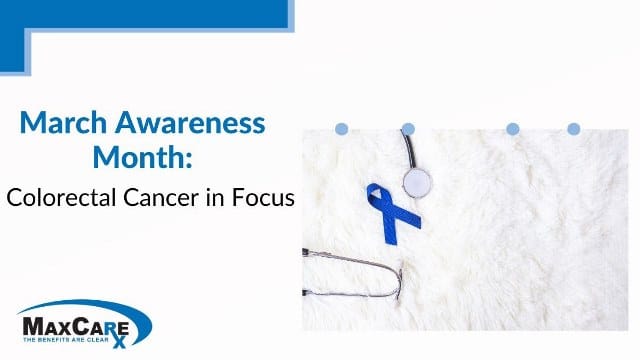March is a time for increasing public awareness about colorectal cancer, a term used to describe cancers that start in the colon or rectum.
Colorectal cancer originates in the large intestine, which consists of the colon and the rectum. These cancers can be referred to separately as colon cancer or rectal cancer, depending on where they start. Colon cancer develops in the longest part of the large intestine, while rectal cancer originates in the last several inches, located near the anus.
By shedding light on this condition, healthcare decision-makers can play a crucial role in the early detection, prevention, and management of the disease.
Signs and Symptoms to Watch For
The early stages of colorectal cancer often present no symptoms. That’s why preventive screenings, like colonoscopies, are crucial. However, as the condition progresses, several signs and symptoms may become more apparent. Recognizing these early can lead to a timely diagnosis and significantly better outcomes.
Changes in Bowel Habits
One of the most noticeable signs of colorectal cancer includes changes in bowel habits. This could mean experiencing diarrhea, constipation, or a change in the consistency of stool that lasts for more than a few days. An important red flag is a narrowing of the stool, which can be indicative of a blockage in the colon.
Persistent Abdominal Discomfort
Persistent abdominal discomfort such as cramps, gas, or pain can be a warning sign. A feeling that your bowel doesn’t empty completely or experiencing regular discomfort in the gut that doesn’t go away with routine remedies might be cause for further investigation.
Rectal Bleeding or Blood in the Stool
Seeing blood in the stool or rectal bleeding is a common symptom, which can appear as bright red or a very dark color. While this can be due to other conditions like hemorrhoids, it should never be overlooked and must be checked by a healthcare professional to rule out cancer.
Weakness or Fatigue
Sudden, unexplained weakness or fatigue can be a signal that the body is diverting energy to fight cancer. Anemia, which can cause fatigue, is often caused by a slow bleed in the colon, not visible in the stool.
Unintentional Weight Loss
Losing weight without trying, especially if it’s significant, can be a symptom of colorectal cancer. As with other forms of cancer, this can occur as the body and metabolism are affected by the disease.
Other Symptoms to Consider
Other potential symptoms might include a feeling of fullness in the abdomen, even after not eating for a long time, vomiting, and anemia diagnosed without an obvious cause.
Importantly, experiencing any of these symptoms does not necessarily mean you have cancer, as many other, less serious conditions can cause similar signs. Nonetheless, it’s imperative not to ignore them and to consult with a healthcare provider for proper screening and diagnosis.
Remember, your well-being is invaluable, and proactive health measures can make all the difference. So, if you notice any of these symptoms persisting, don’t wait – schedule a conversation with your healthcare provider.
Statistics Speak: The Importance of Awareness
Colorectal cancer is the third most common cancer diagnosed in both men and women in the United States. For 2023, the American Cancer Society estimated that there would be over 100,000 new cases of colon cancer and over 40,000 new cases of rectal cancer in the US alone. The disease mainly affects individuals over 50, although it can occur at younger ages.
Cancer Care Outcomes: A Message of Hope
Advances in screening methods and treatments, along with increased awareness, have led to a decline in the mortality rates for colorectal cancer. When detected at an early stage, the 5-year survival rate is about 90%. However, survival rates are lower when cancer has spread to distant parts of the body, highlighting the crucial need for early detection.
Preventative Measures
Proactive Screening: The First Line of Defense
Regular screenings are the most effective tool for preventing colorectal cancer. Screenings can detect precancerous polyps in the colon or rectum, which can be removed before they develop into cancer. The most commonly recommended screening test is a colonoscopy, which should be first undergone at the age of 45 and then repeated at intervals recommended by your healthcare provider—usually every 10 years if no risk factors are present.
High-Risk Categories and Early Screening
For those with a family history of colorectal cancer or known genetic conditions such as Lynch syndrome or familial adenomatous polyposis (FAP), screening may need to begin before the age of 45 and be performed more frequently. Discuss with your healthcare provider to determine the appropriate screening schedule for you.
Lifestyle Modifications: Taking Control of Your Health
Diet and Nutrition
Diet plays a vital role in colorectal cancer prevention. A diet high in vegetables, fruits, and whole grains has been associated with a decreased risk, while a diet high in red and processed meats may increase the risk. Fiber is particularly important as it can help to keep the digestive system clean and healthy.
Physical Activity
Regular physical activity can significantly reduce the risk of developing colorectal cancer. It can help with weight management, reduce inflammation, and improve gut health. Aim for at least 150 minutes of moderate-intensity exercise or 75 minutes of vigorous-intensity exercise each week.
Weight Management
Maintain a healthy weight, as overweight and obesity increase the risk of colorectal and other types of cancer. Implementing dietary and physical activity changes can support healthy weight management.
Alcohol and Tobacco
Limit alcohol consumption—up to one drink a day for women and two for men is generally considered moderate. Avoid tobacco use, as smoking is a known risk factor for colorectal and many other cancers.
Understanding Family History
Knowing your family’s medical history is an integral aspect of cancer prevention. Share any family history of colorectal cancer or polyps with your healthcare provider, as this might influence the age at which you begin screening or the type of screening recommended.
Genetic Counseling
In some cases, your healthcare provider may discuss genetic counseling with you to identify potential hereditary risks. This can lead to personalized screening plans and, possibly, preventive interventions.
Holistic Health Awareness
The interconnectivity of the body means that holistic health practices, focusing on both mental and physical well-being, can impact your cancer risk. Stress management and seeking to achieve a balanced life can support your overall health and play a role in prevention.
While none of these strategies can guarantee cancer prevention, they are proven methods to reduce your risk significantly. It’s a combination of consistent, proactive health measures that primes your body to fight off potential cancerous developments. Always remember, the choices you make today can shape your health outcomes tomorrow.
Treatment Options: Strategies for Recovery
Surgery: The Cornerstone of Colorectal Cancer Treatment
Surgery is often the primary treatment for localized colorectal cancer and may involve the removal of the tumor and part of the surrounding tissue, as well as nearby lymph nodes. In early stages, minimally invasive techniques, such as laparoscopic surgery, might be used to remove polyps or tumors while minimizing recovery time and complications.
Colostomy and Ileostomy
For cancers that are large or located in certain parts of the colon or rectum, a colostomy or ileostomy — processes to reroute the bowel to an opening in the abdomen — may be necessary, either temporarily or permanently. This can be life-altering, but ostomy support groups and healthcare teams can provide invaluable assistance in managing these changes.
Chemotherapy: Systemic Treatment to Destroy Cancer Cells
Chemotherapy involves using anti-cancer drugs to destroy cancer cells and may be given before surgery (neoadjuvant therapy) to shrink a tumor, after surgery (adjuvant therapy) to eliminate any remaining cancer cells, or as the main treatment for cancers that have spread beyond the colon and rectum.
Novel Chemotherapy Protocols
Advancements in chemotherapy now allow oncologists to tailor protocols to the individual’s specific type of cancer and its genetic makeup, potentially increasing the effectiveness of the treatment and reducing side effects.
Radiation Therapy: Targeted Energy to Eliminate Cancer
Radiation therapy uses high-energy beams, such as X-rays or protons, to destroy cancer cells. For rectal cancer, radiation is often used in combination with chemotherapy either before surgery—to shrink the tumor and make it easier to remove— or post-surgery, to eliminate lingering cancer cells.
Targeted Therapy: A Precision Approach
Targeted therapy focuses on the specific genes, proteins, or the tissue environment that contributes to cancer growth and survival. This type of treatment blocks the growth and spread of cancer cells while limiting damage to healthy cells.
Monoclonal Antibodies and Inhibitors
Monoclonal antibodies can recognize and attach to certain proteins on the surface of cancer cells, marking them for destruction by the body’s immune system. Kinase inhibitors block the signals that cancer cells use to divide and grow. Both therapies are examples of targeted treatments used in colorectal cancer care.
Immunotherapy: Boosting the Body’s Defense
Immunotherapy is a type of treatment that helps your immune system fight cancer. Certain drugs can help the immune system identify and attack cancer cells more effectively. Immunotherapy has been a game-changer for some patients, particularly those with advanced stages of cancer.
Medical Disclaimer
Please note that the information provided here is for general informational purposes only and should not be considered professional medical advice. Always seek the guidance of your doctor or another qualified health provider with any questions you may have regarding a medical condition.
Beyond these statistics lies the need for personalized, compassionate care. Understanding that each case of colorectal cancer is as unique as the individuals experiencing it. Partnerships between patients, healthcare providers, and benefits advisors are essential for designing and accessing optimal treatment plans.
To wrap up, March Awareness Month serves as a crucial reminder for all stakeholders within the healthcare community to turn their attention towards the substantial challenge of colorectal cancer. By centering our focus on understanding the disease, promoting preventative strategies, and encouraging early screenings, we can significantly impact the fight against this preventable and treatable condition.



